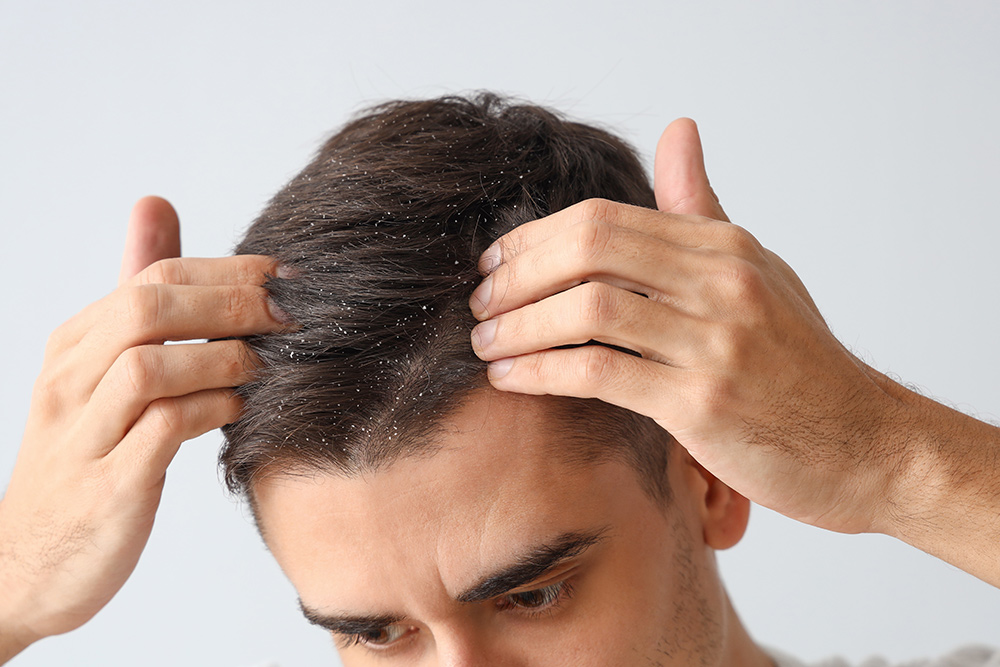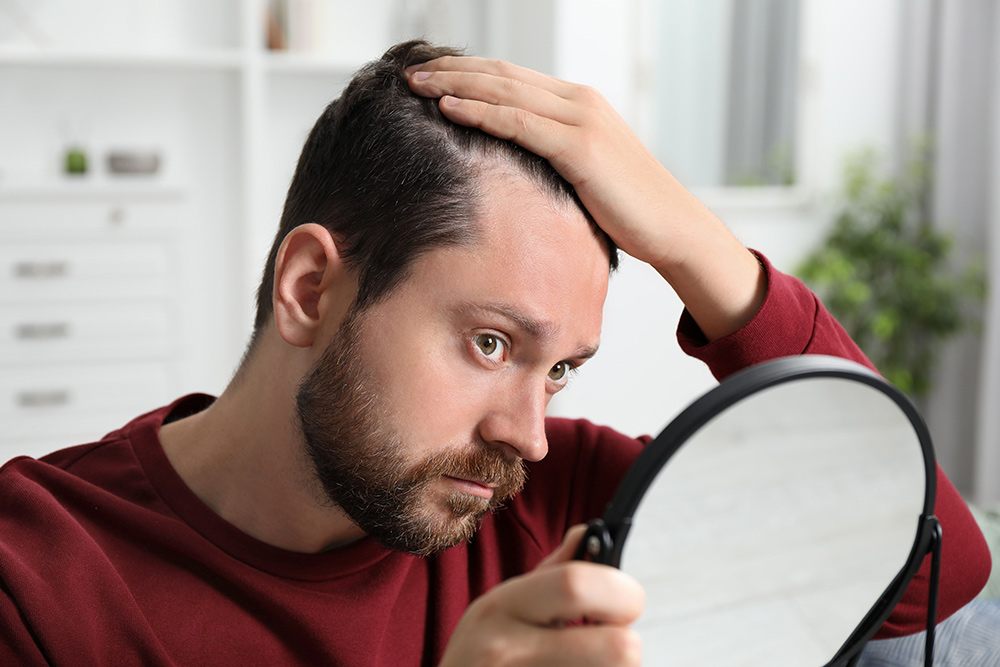Last updated on October 14, 2025
Itchy scalps are something most people experience from time to time, but what happens when the itch is persistent? More importantly, can an itchy scalp and hair loss be linked? The short answer is yes, ongoing irritation and scratching can contribute to hair falling out, and the underlying causes of the itch may also trigger shedding.
In this article, we’ll explore the causes of an itchy scalp, the connection between itching and hair loss and the treatment options available at the Crown Clinic.
Itchy Scalp and Hair Loss: What’s the Connection?
An itchy scalp doesn’t always cause hair loss directly, but when the irritation is frequent or intense, it can lead to damage over time.
Repeated scratching may harm the hair follicles and disrupt the natural growth cycle, which can result in excessive shedding or visible thinning in certain areas. Even if the hair itself isn’t pulled out by scratching, the surrounding scalp environment can become inflamed, making it harder for follicles to function optimally.
In many cases, the underlying cause of scalp itching plays a larger role in hair health. Conditions like seborrheic dermatitis, psoriasis, fungal infections and allergic reactions can inflame the scalp, reduce blood flow, or clog follicles.
This can weaken the base from which hair grows, causing strands to become brittle, break more easily, or fall out prematurely. Left unaddressed, these issues may contribute to long-term thinning and poor scalp health.

Some common itchy scalp causes include psoriasis, dandruff, seborrheic dermatitis and fungal infections.
Common Itchy Scalp Causes
Understanding what’s triggering your itchy scalp is the first and most important step in managing the irritation and preventing related hair loss. A variety of scalp conditions can disrupt the scalp environment and weaken hair follicles over time. Below are some of the most common culprits:
Dandruff and Seborrheic Dermatitis
Both these conditions are among the most widespread causes of scalp itching. Dandruff occurs when the scalp becomes irritated and sheds skin flakes, while seborrheic dermatitis is a more severe form of this condition, often caused by an overgrowth of yeast and excess oil. Both can lead to chronic itchiness, inflammation and visible flakes, especially around the hairline and crown.
Psoriasis
Scalp psoriasis is an autoimmune disorder that results in red, raised, scaly patches on the scalp. These patches may crack, bleed and feel extremely itchy. Over time, persistent inflammation in these areas can damage hair follicles and interrupt the growth cycle, making the hair more vulnerable to shedding.
Fungal Infections (Tinea Capitis)
Also known as ringworm of the scalp, this contagious fungal infection can cause red or black dots where hair has broken off, itchy patches and even pus-filled sores in severe cases. If left untreated, it can lead to permanent hair loss due to scarring and follicle destruction.
Allergic Reactions
Sometimes, hair products like shampoos, conditioners, dyes and styling sprays contain harsh chemicals, fragrances, or preservatives that trigger allergic reactions. This can lead to itching, redness, flaking, and even burning sensations, particularly in those with sensitive skin or scalp eczema.
Dry Scalp
A lack of moisture, often worsened by cold weather, excessive washing, or hot showers, can make the scalp dry and tight. This dryness can cause flaking, similar to dandruff and lead to mild to moderate itching. While not typically a direct cause of hair loss, dry scalp can make strands more brittle and prone to breakage.
How to Stop Itchy Scalp
If you’re experiencing an itchy scalp and hair falling out, early intervention is key. Managing both the itch and the underlying cause can help preserve hair health and prevent long-term damage.
Choose Gentle Haircare Products
Opt for shampoos and conditioners that are free from sulfates, fragrances, alcohol and parabens. These can strip your scalp of natural oils or cause irritation. Look for soothing ingredients like aloe vera, tea tree oil (in small concentrations), or salicylic acid for mild exfoliation.
Don’t Over-Wash
While it’s important to keep the scalp clean, washing your hair too frequently can strip away the protective natural oils your scalp needs to stay balanced. Aim to wash your hair two to three times a week, adjusting based on your hair type and lifestyle.
Treat Underlying Conditions
If you suspect conditions like dandruff, psoriasis, or fungal infections, medicated shampoos or prescription treatments may be necessary. Ketoconazole, zinc pyrithione, coal tar, or corticosteroid-based products are often used to control symptoms and reduce inflammation.
Avoid Scratching
Although it can feel relieving in the moment, scratching the scalp damages the skin’s barrier and can lead to infection or follicle trauma. Instead, apply a cool compress or use a soothing scalp serum designed to relieve itching.
Maintain Scalp and Skin Health from Within
Eat a diet rich in antioxidants, essential fatty acids, vitamins A, C, D and E and stay well-hydrated. These nutrients help strengthen skin barriers and support healthy follicle function.

If you’re dealing with hair loss, suitable treatments may include FUE hair transplant, CPI hair transplant and sapphire hair transplant.
Treatments for Hair Loss at Crown Clinic
If you’re dealing with persistent scalp itchiness and have noticed increased hair fall or visible thinning, you’re not alone. At Crown Clinic, we understand how scalp conditions can affect not just your hair, but your confidence too. We offer a range of personalised treatment options designed to restore healthy hair growth while also addressing the root cause of your hair loss.
FUE (Follicular Unit Extraction) Hair Transplant
This minimally invasive procedure involves harvesting individual hair follicles from a donor site (usually the back of the head) and transplanting them into thinning or balding areas. It delivers natural-looking results with minimal downtime and is ideal for those with patchy hair loss caused by scratching or chronic scalp inflammation.
Sapphire Hair Transplant
An advanced variation of FUE, this technique uses ultra-fine sapphire blades instead of traditional steel instruments. Sapphire blades can create smaller, more precise incisions, which may lead to faster healing, less scarring and higher graft survival rates, particularly beneficial for sensitive or previously inflamed scalps.
Non-Surgical Hair Loss Treatments
For patients not ready for surgery, we also offer non-invasive therapies that support scalp health, reduce inflammation and stimulate dormant follicles. These may include topical medications, scalp treatments, or prescription regimens tailored to your condition.
Every treatment plan at Crown Clinic is customised based on your scalp condition, hair loss severity, lifestyle and desired outcome. We take the time to assess your scalp health thoroughly before recommending the most effective approach. In some cases you made need to be referred to a Dermatologist for more in-depth testing.
Book a Free Hair Consultation
Are you experiencing an itchy scalp and noticing increased hair fall, thinning, or bald patches? Don’t wait until the problem worsens.
At Crown Clinic, we bring over 50 years of experience in hair restoration and offer a truly personalised approach to treatment. Whether you’re exploring FUE hair transplantation or non-surgical options, our expert team will take the time to understand your medical history, hair loss concerns and goals so we can recommend a solution that works for you.
Call us on +61 2 9134 4788 or book your free consultation here to get started.
FAQs
What is the treatment for an itchy scalp?
Treatment varies depending on the underlying cause. Mild cases may respond to anti-dandruff or medicated shampoos, while more severe conditions, such as psoriasis or fungal infections, may require prescription antifungals, corticosteroids, or oral medication. A tailored treatment plan from a healthcare professional can help relieve itching and protect hair follicles from damage.
What is an itchy scalp a symptom of?
An itchy scalp can be a sign of various conditions, including dandruff, seborrheic dermatitis, scalp psoriasis, allergic reactions, fungal infections like tinea capitis, or simply dry scalp. If accompanied by flaking, redness, or hair loss, it’s important to investigate further.
Can an itchy scalp cause hair loss?
Yes. While an occasional itch is harmless, chronic or severe itching can lead to excessive scratching. This mechanical stress may damage the scalp and hair follicles, resulting in breakage, inflammation, or even scarring that impedes future hair growth.
How can I stop my itchy scalp from getting worse?
Avoid scratching, use gentle hair care products and steer clear of harsh chemical treatments. It’s also important to identify and treat the root cause, such as whether it’s a fungal infection, scalp condition, or allergic reaction.
Does scratching the scalp damage hair follicles?
Yes. Repeated or forceful scratching can inflame the scalp, weaken the protective barrier and cause microtears. Over time, this may lead to follicular trauma, hair shaft breakage and in some cases, permanent follicle damage.